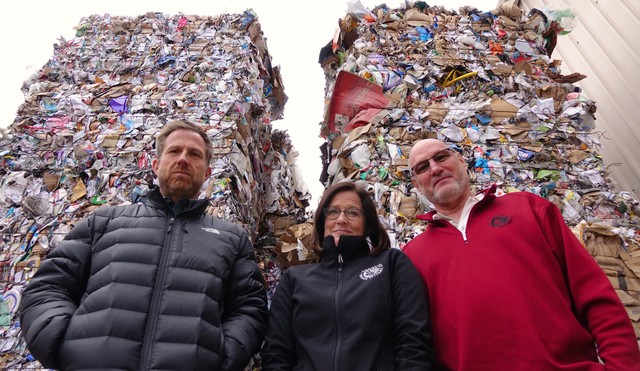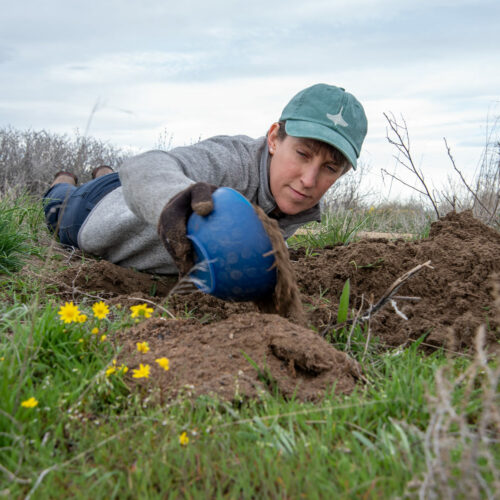
This Is Why A Lot Of Our Recycling Is Going To Landfills
It’s one of the consequences of new restrictions on shipping recyclables to China.
Across the Northwest, more and more places are raising recycling fees, reducing and even canceling curbside collection and sending formerly recyclable material to the dump.
Last year, the world’s biggest buyer of recyclables announced a tough new set of rules for how clean its recycling imports need to be as part of a policy called National Sword, which aims to reduce pollution.
Since Jan. 1, the Chinese government is only allowing recycling imports with .5 percent contamination or less. That means there can be virtually no plastic mixed in with the paper recycling, no food waste left in plastic containers and no garbage in the recycling.
U.S. recycling companies say they can’t meet that standard — in part because there’s too much trash mixed in with the recycling they’re picking up at the curb. Prohibited items such as Styrofoam, diapers, garden hoses, plastic bags and coffee cups still show up in curbside recycling bins far too often.
Peter Spendelow, natural resource specialist at the Oregon Department of Environmental Quality, said there used to be Chinese buyers who would accept highly contaminated loads of recycling from the U.S. and sort through it themselves. But the Chinese government has put an end to that practice.
“Countries don’t want to be a dumping ground for the rest of the world,” he said.
End Of Recycling As We Know It?
With fewer buyers for our recyclables, many companies have asked the state of Oregon for permission to dump the excess in landfills. Some places have limited the items they will accept in curbside bins to things they know they can sell while others have suspended curbside recycling altogether.
Recycling companies have found some new buyers in other countries, but those countries might not be able to handle the volume that China once took.
“The situation is still fairly dire,” Spendelow said. “There aren’t a whole lot of markets for mixed plastics.”
So far, many places, including Portland, are still collecting the same curbside recycling items they always have — even though some of that material has nowhere to go but landfills.
“We want to keep collecting it so that when markets come back and they are able to move this material they don’t have to reeducate everyone on how to do it,” Spendelow said. “But we can only make that argument for so long.”
Oregon DEQ is still approving landfill disposal of recycling that doesn’t have a market, but the agency might not allow that to continue much longer.
New Rules, Higher Fees And ‘Oops’ Tags
A new committee of recycling leaders across Oregon is meeting regularly to discuss possible solutions and long-term changes to the state’s recycling systems, such as restricting the kinds of materials that can go in curbside recycling bins, separating paper from plastic at the curb, improving sorting capabilities at recycling facilities or ticketing people for their recycling mistakes.
In Clackamas County, officials have started placing “oops” tags on recycling bins with the wrong materials in them.
In March, Rogue Disposal & Recycling in Medford slashed its list of what’s recyclable to just four items after stockpiling and dumping thousands of tons of unwanted paper, plastic and glass.
The company did an audit of the material they were collecting in curbside recycling bins and found nearly a quarter of it didn’t belong there.
“Twenty-four percent of those recycling carts was filled with trash — stuff that has never been recyclable,” said company spokeswoman Laura Leebrick. “We were rolling along thinking everything was fine because nothing was getting rejected. We didn’t realize how much garbage was in there.”
The city of Portland just raised garbage collection rates $2.55 per month in large part to cover the added costs of recycling.
Bruce Walker, recycling program manager with the city of Portland, said recycling companies used to make some money by selling recyclable materials, and that would offset the cost of curbside collection. Now, they’re paying companies to take recyclable materials more than it would cost to send them to the landfill.
“They get an invoice instead of getting a check,” Walker said. “This is the first time ever the numbers have gone so far above the cost of landfilling. No one expected it to get this bad.”
The latest study found about 9 percent of what Portlanders put in their recycling bins is actually trash. Reducing that contamination rate could help recycling companies find new buyers for the city’s recyclables.
“Clearly, we need to do a better job of reaching out to the public to remind people that getting creative with recycling is not helping,” Walker said. “Wanting to recycle is a good thing, but putting things that don’t belong there only adds to the program costs. Somebody has to remove that plastic cup you put in there and throw it away. It still goes to the landfill.”
Experts doubt our recycling will ever reach China’s 0.5 percent contamination standard. However, you can do your part to improve the system by checking your local hauler’s list of acceptable items before putting things in the recycling bin.
Copyright 2018 Earthfix
Related Stories:

Kennewick finds ‘forever chemicals’ in its drinking water for the second spring in a row
For the second spring in a row, Kennewick has found “forever chemicals” in its drinking water that are above Washington state’s standards.

Ecologists help with burrowing owl ‘spring cleaning’ at Umatilla Chemical Depot
Lindsay Chiono, wildlife habitat ecologist for the Confederated Tribes of the Umatilla Indian Reservation (CTUIR), does some seasonal maintenance, or spring cleaning, on one of the 180 total artificial nesting

US Forest Service employees return to work after mass terminations
Katijo Maher, president of a local chapter National Federation of Federal Employees, stands next to a fire danger sign Tuesday in Leavenworth. Maher said she has 37 years of experience















